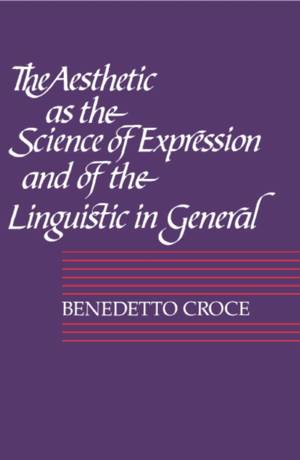
- Retrait gratuit dans votre magasin Club
- 7.000.000 titres dans notre catalogue
- Payer en toute sécurité
- Toujours un magasin près de chez vous
- Retrait gratuit dans votre magasin Club
- 7.000.0000 titres dans notre catalogue
- Payer en toute sécurité
- Toujours un magasin près de chez vous
The Aesthetic as the Science of Expression and of the Linguistic in General, Part 1, Theory
Benedetto Croce
82,45 €
+ 164 points
Format
Description
The Italian philosopher Benedetto Croce (1866-1952) spent most of his life as a private scholar in Naples. His Estetica, which first appeared in 1902, has remained a seminal work not only for aesthetics but also for general linguistics. As the full title indicates, this is not a narrow work dealing with the theory of art and criticism. For Croce intended this to be the first part of his "philosophy of the spirit" and he thus presents a systematic general theory intended to solve all philosophical problems. The work presents an account of the structure of the human mind and shows how art arises naturally from that structure, as well as introducing the influential notion of the organic unity of a work of art. As a result, art is shown to be integral to any life and an essential aspect of what it is to be human. This new translation of the first and most important part of the work (Theory) supersedes the defective translation by D. Ainslie, first published in 1909. It is based on the most recent Italian edition (1990). In his foreword the translator addresses the difficulties in translating certain key words in the Italian original, "scienza", "fantasia", and of course, "estetica" itself. He also furnishes the reader with helpful explanatory annotation. This publication will be of cardinal importance for all those interested in the philosophy of art, the history of criticism, and the history of linguistics.
Spécifications
Parties prenantes
- Auteur(s) :
- Traducteur(s):
- Editeur:
Contenu
- Nombre de pages :
- 212
- Langue:
- Anglais
- Collection :
Caractéristiques
- EAN:
- 9780521359962
- Date de parution :
- 31-01-92
- Format:
- Livre broché
- Format numérique:
- Trade paperback (VS)
- Dimensions :
- 153 mm x 227 mm
- Poids :
- 308 g

Les avis
Nous publions uniquement les avis qui respectent les conditions requises. Consultez nos conditions pour les avis.






